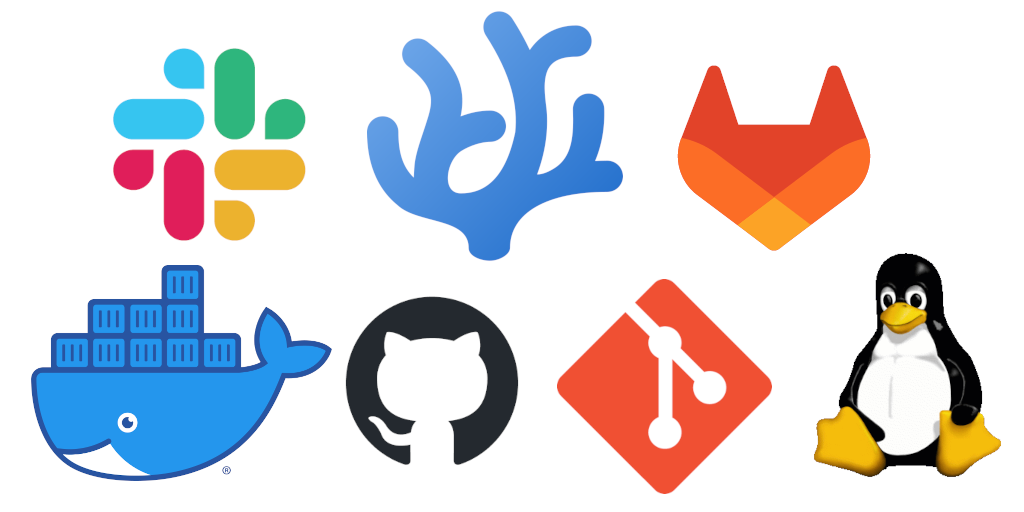Published
My Developer Toolbox
The tools I use daily for development.

Welcome to the inner sanctum of my developer toolbox, where lines of code mingle with whimsical gadgets and mysterious shortcuts. It’s a place where software sorcery meets a touch of madness and a dash of caffeine-induced inspiration. In this blog post, I’ll briefly discuss the quirky treasures that reside within my digital workshop. Join me as we explore the tools that keep my programming adventures both entertaining and productive.
Table of Contents
- IDE
- Terminal
- Operating System
- Docker
- Communication
- Version Control
- Command Line & Scripts
- Notes
- Conclusion
IDE
The first stop in our toolbox tour is none other than my IDE of choice, VSCodium. VSCodium is to VSCode as Chromium is to Chrome. Yes, VSCode is an open-source project, but its binaries are proprietary. Call me a purist, but if I’m using an open-source IDE, I would like the whole thing to be open-source.
Terminal
When developing I always have 3 programs running: Firefox, VSCodium, and my terminal of choice, Tilix. The main reason I like Tilix is that with a single keyboard shortcut, I can cut the window vertically or horizontally into more terminals. Generally when programming I have a project open in two panes of one tab in Tilix. This works especially well with the monorepo I work on for my day job. One pane is the root of the monorepo while the other is the API portion of the monorepo (and occasionally there will be a third with the UI).
Operating System
With most of my tools being open-source, it should come as no surprise that I run Linux as my Operating System. Specifically, I’m running Kubuntu with the Plasma desktop for its flexibility and customization options.
Docker
I run Docker and Docker Compose frequently for both work and side projects. I even built a project around Docker that makes compiling apps for Ubuntu Touch easy. I find the tooling around Docker to be easy to use and ubiquitous.
For ease of use, I have a Bash alias
setup to invoke the docker compose command via the shortcut dc.
Communication
Communication is one area where I veer away from my open-source tendencies as my main communication platform is Slack. Since this is for work there isn’t much choice, but I like Slack for its features like threads and search. I have minimized my notification preferences as much as possible so I can avoid unnecessary distractions while coding.
On the non-proprietary side of things, I use Thunderbird as my email client and it allows me to pull in multiple email accounts under one interface.
Version Control
My main go-to for version control is Git. I’ve used a few different version control systems over the years and prefer to work in Git. I also prefer to use it via the command line rather than through the VSCodium integration. I find myself most comfortable at the command line since it is generally faster and I can rely on muscle memory more than an interface.
I use Git via a shortcut g, provided by mingit.
Mingit takes the already short git command to the next level, so I can type
g co <branch name> rather than the longer git checkout <branch name>.
As for other shortcuts, I use git-open via the command ggo.
Git-open lets me quickly open up a repository in GitHub/GitLab/Bitbucket from the
command line. Then I can jump straight into issues or pull requests.
For Git hosting I use both GitLab and GitHub frequently. I mainly use GitHub for work and GitLab for side projects. I like the logical split and I especially like hosting my personal projects on GitLab due to its open-source nature and the ability to self-host it if I were to choose to do so in the future.
Command Line & Scripts
I’ve already briefly talked about some of the shortcuts I use for Docker and Git.
But I also have a quick and dirty script for NPM called n. Written in Python
it allows me to run NPM scripts without typing out npm run <script>. I have a similar
script for Yarn, y, but thatis mostly just a shortcut without anything added.
The other big shortcut I use constantly is my start script s. It’ll automatically
start a project I’m working on by detecting if it should run an NPM/Yarn command,
start Docker Compose, or run a custom start.sh script.
Since I greatly prefer the command line over GUIs, I also use the DBCLI
tools mycli and pgcli for database access. These tools vastly improve the default
database shell tools. No more having to remember to put a semicolon at the end of your
SQL statements!
Notes
While not directly programming related, I do use a note-taking tool called Logseq daily. I’ll keep notes for projects, cool new tools or libraries I find, and much more. I’ve found the daily log feature of Logseq useful for jotting down notes to track what I’ve been working on for my day job.
Logseq has some advantages over its competition since all of its notes are stored privately and locally in text files. But Logseq itself is more than a glorified text editor as it excels at linking notes together (among other things).
It also contains notes outside of programming (like when I last got an oil change for my car) and has been indispensable in keeping myself organized.
Conclusion
Thanks for joining me on this trip through my toolbox. If you would like to discuss anything about these tools or show me a shiny new tool to replace my existing tools just contact me via my website!
